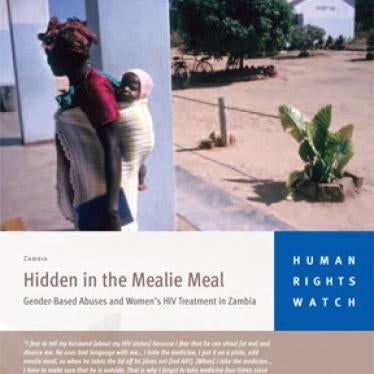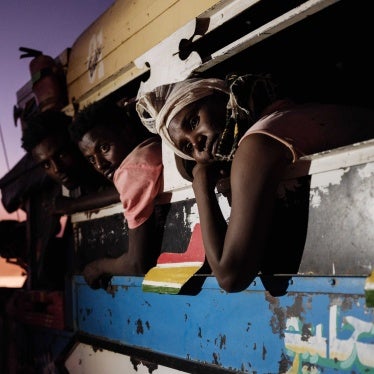The Zambian government should adopt a comprehensive law to curb sexual and gender-based violence (SGBV) and accelerate establishment of hospital-based coordinated response centers to help the victims and survivors, Human Rights Watch said today. Care Zambia, in partnership with the government and a number of nongovernmental organizations, will open the first such center outside the capital today at Kabwe General Hospital.
"Finally, survivors of sexual and gender-based violence in Kabwe, including women living with HIV, will have a place to get the help they need," said Nada Ali, women’s rights researcher for Africa at Human Rights Watch. "Such violence is endemic in many parts of Zambia, and contributes to the spread of HIV, which is devastating Zambia’s population."
The center will provide medical services, counseling, and legal aid as well as assistance with reporting attacks to the police. It is important for the government and its partners to move quickly to make such centers available in other districts, Human Rights Watch said.
In 2006, Zambia established the first coordinated response center in the capital, Lusaka. Led by Care Zambia, the center is not based in a hospital but works closely with the University Teaching Hospital in Lusaka. In 2008, Care Zambia formed a partnership with the government and a number of nongovernmental organizations (NGOs) to establish similar coordinated response centers in health facilities in six districts.
"The Ministry of Health has given us space in health centers to establish similar centers in the provinces and districts of Lusaka, Mazabuka, Kitwe, Ndola, and Livingstone," said Christine Munalula, program manager for A Safer Zambia (ASAZA) at Care Zambia. "We are currently negotiating a memorandum of understanding with the ministry on how these centers will operate and are working to renovate and equip them."
Sexual and gender-based violence against women and children is common in Zambia, especially in Lusaka and the Copperbelt provinces. It is difficult to determine the true extent because many victims or survivors do not report the violence or underreport it. The Zambian police’s Victims Support Unit had reports of 65 rapes of adults and 626 of children in Lusaka alone from January to August 2008.
The high levels of such violence contribute to Zambia’s AIDS pandemic. In a December 2007 report, "Hidden in the Mealie-Meal: Gender-Based Abuses and Women’s HIV treatment in Zambia" Human Rights Watch showed that violence against women by intimate partners and the lack of secure property rights impede women’s access to HIV information and testing, and interfere with their ability to start or continue using freely available HIV treatment.
The report urged the Zambian government to establish a task force to examine various models for addressing sexual and gender-based violence in health facilities, to devise a model that would be effective for Zambia, and put programs into operation in the country’s nine provinces.
The report also recommended that the government enact and enforce legislation to address shortcomings in the penal code, which currently does not criminalize marital rape and psychological abuse. The Ministry of Justice and the Zambia Law Development Commission have been working on a draft bill addressing sexual and gender-based violence, in consultation with NGOs, but the bill does not criminalize marital rape.
"The Zambian government should back the important progress it has made on providing support services to victims by adopting a long-overdue Sexual Offences and Gender Violence Bill, which needs to include provisions that criminalize marital rape," Ali said.
Background
The continuing high levels of sexual and gender-based violence contribute to Zambia’s already devastating AIDS problem. According to UN estimates, HIV prevalence in Zambia was 13.1 percent in 2007. Although this represents a reduction in HIV prevalence compared with 2006, in real terms an estimated 182,228 more people were affected in 2007 because of population increases. Prevalence of HIV among pregnant women in 2007 was estimated to be 19.3 percent. The number of people on HIV treatment has increased, according to the United Nations, from 82,030 in 2006 to 151,000 in December 2007.
The coordinated response centers are funded by United States President’s Women, Justice, and Empowerment Initiative (WJEI) and the European Union. Care Zambia is the lead agency for establishing the centers, in partnership with a number of Zambian government ministries and agencies, including the Ministry of Health, the Gender in Development Division, and the Victim Support Unit. Other partners include a number of nongovernmental organizations such as World Vision, Africare, Catholic Relief Services, and Zambia’s chapters of Young Women’s Christian Association, Women and Law in Southern Africa, and the International Justice Mission.






